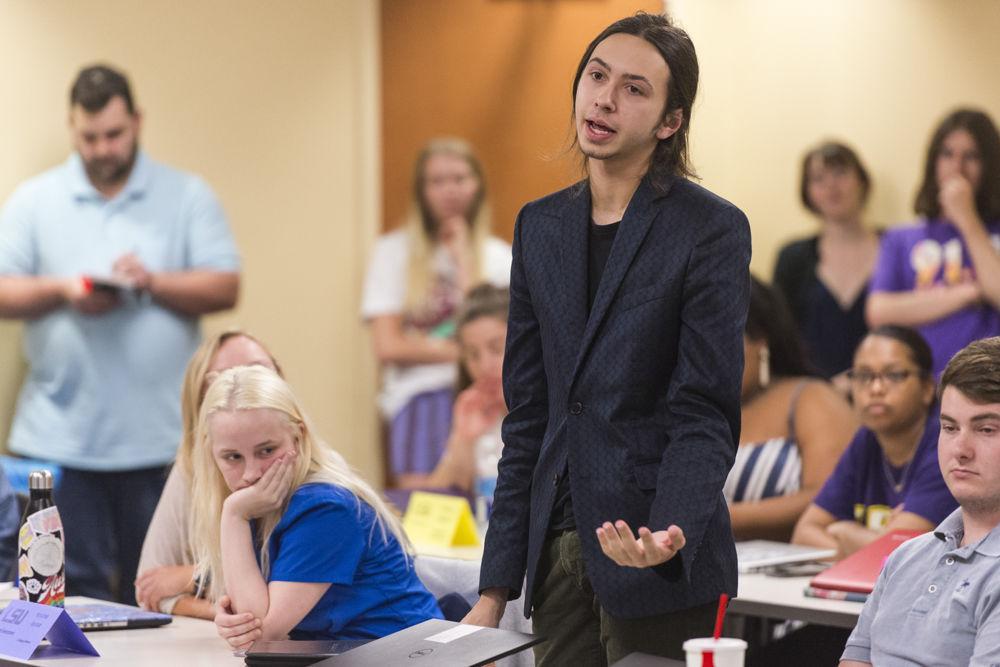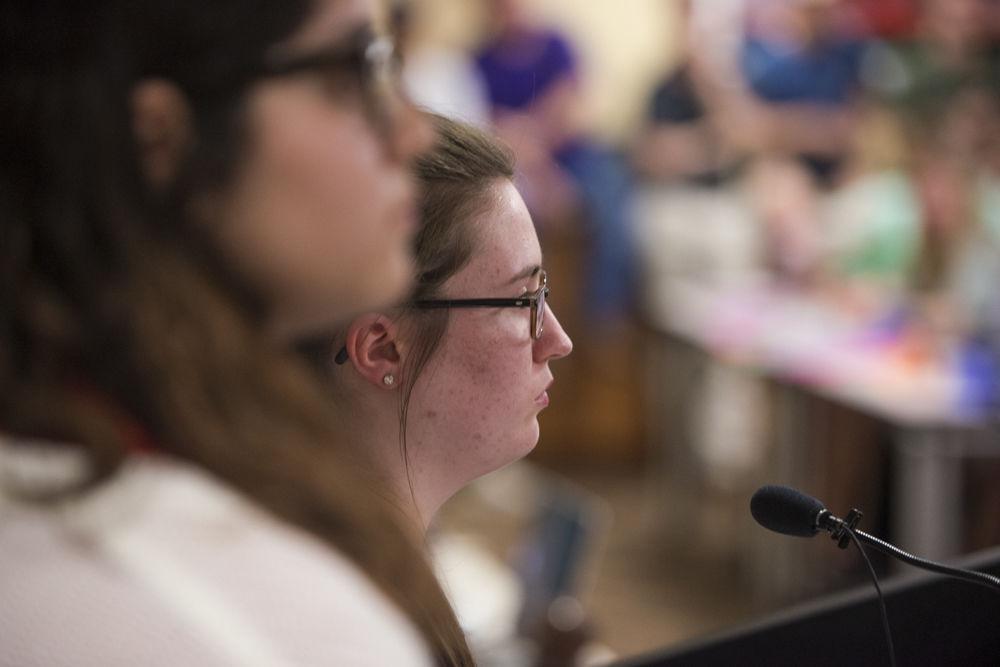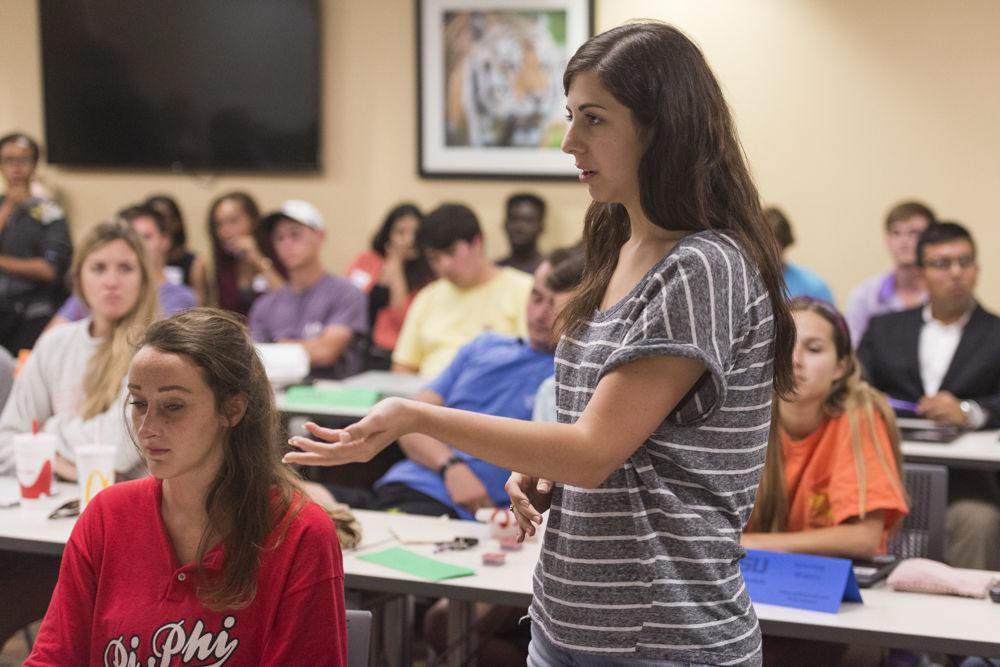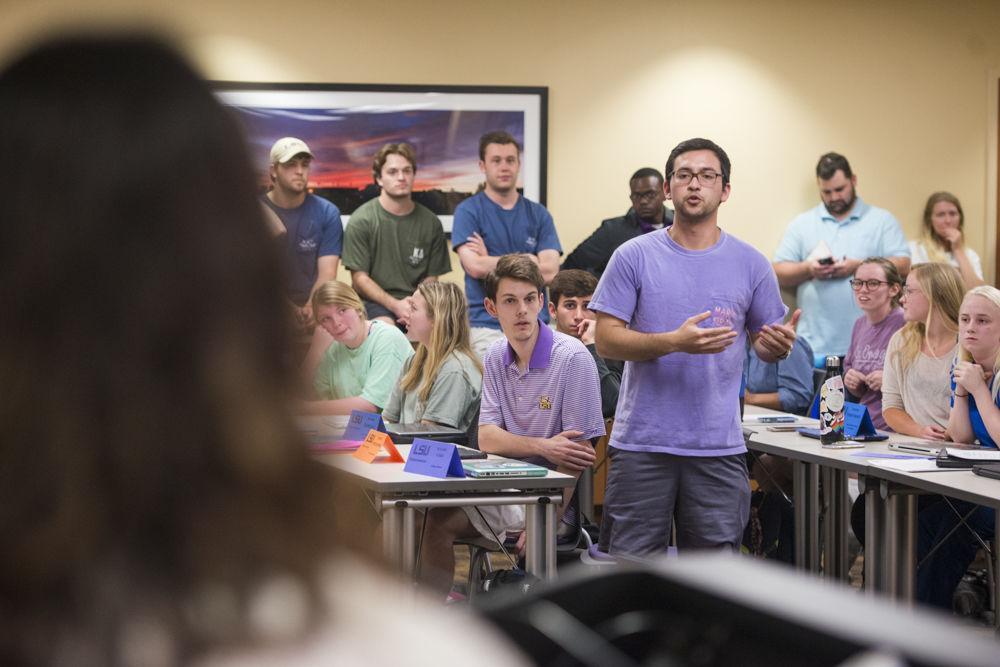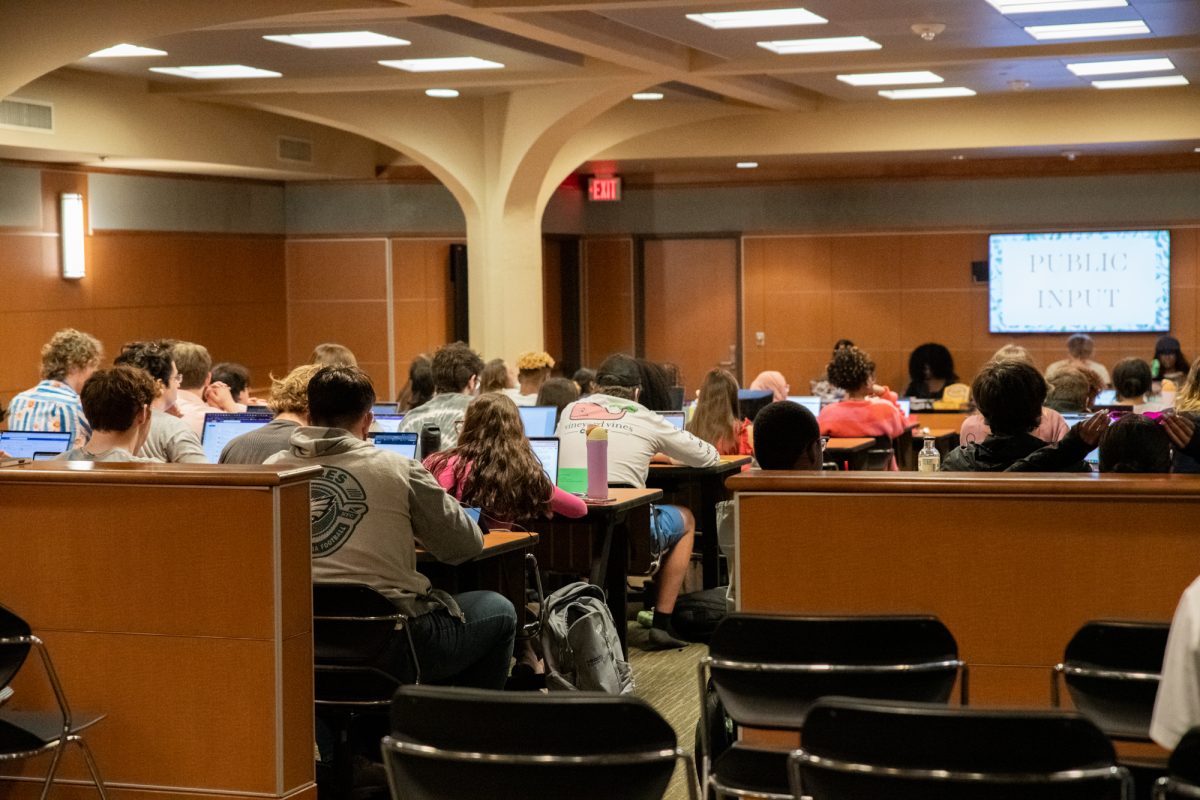On Tuesday, April 24, dozens of University students attended an LSU Student Government Senate meeting to voice their opinion on legislation previously passed at an April 11 meeting.
Members of LSU Student Media and the College of Music and Dramatic Arts voiced their displeasure with the passing of two Student Government Concurrent Resolution bills which recommended cuts to student fees for all University students.
SGCR No. 15 recommends a referendum be placed before the student body to request the Board of Supervisors examine the Student Media fee. The legislation proposes the fees for the Gumbo yearbook be cut entirely, and have the remaining fees for The Daily Reveille, Tiger TV and KLSU consolidated into one fee. The legislation also recommends Legacy magazine be discontinued and the fees for it to be reallocated to the remaining student media outlets. If the student body votes in favor, and the referendum passes in the fall, part-time students would pay a $2 fee per credit hour, while they currently do not pay any Student Media fee.
SGCR No. 16 recommends a referendum be placed before the student body to request the Board of Supervisors examine the Performing Arts fee. The legislation proposes the fee be cut entirely and funding instead be done through the College of Music and Dramatic Arts itself.
Both resolutions were passed at the Student Senate meeting on April 11. The Daily Reveille’s designated SG reporter was unable to attend the meeting due to his recovery from reconstructive ACL surgery.
The bills were drafted by student senator John “Jack” Green, who co-chaired the Student Fee Value and Assessment Committee. The committee was formed in February with the purpose of reviewing student fees that had not been examined in several decades. The committee was made up of five student senators and five members of the SG executive branch.
“I think this is important given the context of where we are right now as a state and higher education and the situation that students are facing,” Green said in a February interview with The Daily Reveille. “You see stories and press releases every day about how first-year retention in the state of Louisiana for public schools is so low, and it’s because of high fees and high tuition with low state funding.”
The resolution was debated in the Student Senate meeting on April 11.
According to the minutes from the meeting, Green explained the $8 Gumbo fee should be cut entirely because so few people actually purchased the yearbook. Green also said Legacy was not well-known outside of mass communication students, and the pick-up rate was not accurately measured.
Green added the committee found the fees for the various student media outlets were not all being used accordingly, and that money was being used across all outlets. Green said in response to a senator’s question that he had been in contact with student media and planned to be in contact in the future.
“[I] asked questions about how [Student Media would] feel about cuts, attachment to Gumbo — [they] didn’t seem to attached to Gumbo,” Green said in the meeting, according to the minutes. “[I] haven’t come back to them asking how they’d feel about the cuts. [Student Media is] not currently aware of exactly what we’re asking of them, but we’ll be in touch.”
Response from Student Senators
The legislation was then debated in the Senate, according to the minutes. Then-Manship School of Mass Communication student senator and former columnist at The Daily Reveille Frederick Bell opposed the legislation, and proposed an amendment to strike the removal of funding for Legacy, which failed.
Manship senators Bridget Ryan and Bailey Allmon were in favor of the legislation. Allmon was against Bell’s proposed amendment, stating the lack of popularity for Gumbo and Legacy on campus made it an unnecessary expense for all students, according to the minutes from the April 11 meeting.
“I felt that it was paramount for the student body as a whole to look at these fees,” Allmon said. “I did talk to some of my friends in Manship, and they were like ‘Oh, I’ve never gotten like a Legacy or a Gumbo’… as far as the people I talked to, just friendly-wise that was the consensus I got. I probably should’ve done more research on that, but I felt that all students should have a choice [in] what their student fees should go to.”
Allmon brought up the possibility of SG recommending cuts at the April 6 Media Board meeting with the heads of all departments of Student Media and various representatives from campus and the Manship School. Allmon said she felt it appropriate to bring up during this time because budget cuts are part of the job process.
“If you were to become an insurance broker, and someone asked you ‘Hey, the United States government is looking to cut insurance,’ wouldn’t you ask them how they’d handle a budget cut?” Allmon said. “I didn’t know what process [the committee] were in, so this was just the buzz that I heard was happening.”
Several senators and other SG members repeatedly referenced the SG website, where agendas and legislation are posted for the public to view. Allmon said she did not talk directly to members of student media or Manship School students about the legislation, but said she’s not required to do so in her role as student senator.
“It’s not stated anywhere in the governing documents or the bylaws that I have to personally email about legislation that’s going through Senate,” Allmon said. “I don’t think it’s not necessary. I just thought that students would seek it out on their own. I did bring it up in a Media Board meeting with all the student media heads. I think it is part of [Director of Student Media John] Friscia’s job to inform his students about what’s going on and what’s at stake. That’s also on him.”
In the Student Government Governing Documents, obtained from the SG website under Legislative Branch Affairs and Student Senator Duties, it states that “the primary duty of a Student Senator is to represent the constituency of his/her Academic Area.” The Governing Documents are no longer available on the Student Government website. SG vice president Rachel Campbell said this may be due to a clerical error, as she and the new SG president made some minor additions to the Governing Documents.
Allmon and Green both said while senators are elected by their senior colleges, they also have a duty to the student body as a whole and aren’t required to vote based solely on the views of students from their senior colleges.
“If we feel that the best interest of the majority supersedes that of the minority we represent, then it is completely within our right and ability to vote accordingly,” Green said.
Former senator Bell said the purpose of Student Senate is to represent the students, adding that it’s important student voices be heard as part of the process.
“My point of view would be, if you’re going to write a piece of legislation at all, before you even bring it up, you need to go and meet with the people you’re trying to change something for,” Bell said in an interview with The Daily Reveille.
Bell said the information he was given by the SFVAC committee in the April 11 Senate meeting felt “comprehensive” and “transparent,” although he added that some information regarding Student Government is not readily available to students.
“I should’ve — the week before when the legislation was made available to me — looked at it and said ‘this isn’t right’ and brought it to my constituents,” Bell said. Later, in a message to The Daily Reveille, Bell added: “It was definitely a dereliction of duty on my part. I’m committed to helping you all reverse this.”
Bell said even though he will not be a student at the University next semester, he wants to continue to help students fight against the referendum.
Allmon stands by her vote and said it should be up to the student body to decide where their student fees are going.
“I voted yes to a referendum to put the fee in front of the students to vote if they want to keep or cut these two things,” Allmon said. “Students have voted in the past to increase their fees. They voted to pay $5 per semester to make the UREC. So, if they find these two publications necessary, they’re going to vote in favor of them.”
SFVAC committee’s interaction with affected parties
SG president Stewart Lockett said that in a meeting with Friscia on April 4, he urged Friscia to reach out to Green regarding the legislative process of SGCR No. 15. Friscia said he did not reach out to Green at that point but had previously requested that Green keep him updated on the process.
“I said, ‘how will we find out, and when will we find out what the committee’s findings are?’” Friscia said. He added that Senator Green said the committee was “still looking everything over” and would get back to him.
The legislation passed with 93 percent of the Senate in favor. The referendum will go before the student body in the fall.
After the approval of SGCR No. 15, Green proposed SGCR No. 16, stating the services provided by the fee such as music, theater and dance programs did not benefit enough of the student body to justify a campus-wide fee. Senators agreed the funding for Music and Dramatic Arts programs could be provided through the college itself. The College of Music and Dramatic
Arts did not have an SG representative at the time of the legislation’s passage.
College of Music and Dramatic Arts Dean Todd Queen said members of the college administration were contacted by SFVAC committee members in mid-February to inform them of the committee’s purpose and to get some information from them about the performing arts fee.
“They sent us the directive they had and asked us for some information, so we sent that,” Queen said. “They asked us for some more information, we sent that and we asked to meet with them. They said yes, happy to.”
Queen clarified that no member of the committee offered to meet with members of their administration until Queen requested a meeting with the committee. He was unable to attend the meeting; however, Chair of the School of Theatre Kristin Sosnowsky and CMDA Assistant Dean of Finance and administration Julie Perkins did attend the meeting.
Senator Green later met with Perkins privately to clarify information, but Queen and the other administrators felt the committee “were not asking the kinds of questions they expected for the first time around.”
“I’m not entirely sure we would’ve been made aware of the assessment committee if they hadn’t emailed us for some clarification on some stuff,” Sosnowsky said.
Queen said no member of the administration or student body was made aware that legislation was being brought before Student Senate recommending a cut to the Performing Arts Fee after the mid-March meeting with senator Green.
SGCR No. 16 passed in the senate with 100 percent favorability.
Queen said no member of SG contacted him or any other administration member to tell them the legislation was passed and would go to a referendum for the student body to vote on in the fall. He found out the afternoon of April 24.
“I was walking in the lobby back from the restroom, and I hear [a student] reading the [Student Government] meeting notes, and then I sat there and listened,” Queen said. “So, literally I heard because I was walking through our lobby.”
Queen said he thought there were “several flaws” within the committee’s processes that they’d need to examine.
“The fact that they’re not involving students in an open and transparent way is going to be problematic,” Queen said. “If and when our students find out I think you would expect to hear some really vocal [backlash] from our students. This would have an incredibly negative impact on their experience here at LSU.The irony of Student Government recommending to modify and to decrease the performing arts fee when advancing arts and culture is one of the six pillars of the strategic plan of the University has not been lost on us, and I’m not sure should be lost on the student body.”
Friscia emailed senator Green on April 12 to check on the status of the student media fee recommendations. Green responded to Friscia saying the legislation passed with a 93 percent approval the night before. Friscia and Green then met on the following Monday after Friscia noticed some inaccuracies in the numbers used in the proposed and passed legislation.
When asked about the inconsistency in the legislation, SG president Stewart agreed the numbers in the legislation were incorrect but did not feel that corrected numbers would’ve changed the legislation or the opinion of the senate.
“I feel that the legislation was as thoroughly vetted as it could’ve been,” Stewart said.
The Email
After meeting with Green, Friscia was told during an April 17 meeting with incoming SG vice president Campbell that a meeting regarding the cutting of Student Media fees would take place Wednesday, April 25.
On April 23, members of Student Media learned the legislation had already been passed on April 11 after an employee of The Daily Reveille was forwarded the minutes from the meeting from a friend in SG.
The Daily Reveille managing editor Natalie Anderson sent an email to Student Media alumni asking for testimonials about the impact Student Media had on them. The testimonials were intended to be included in an editorial about the #SaveStudentNewsrooms movement, a national campaign to demonstrate the importance of student media at universities around the country. In the email, she said Student Government “blatantly lied” to Student Media by not gathering the opinions of Student Media employees before voting on the legislation, not notifying them of the meeting on April 11 and informing them of a meeting on April 25 that was not taking place.
A screenshot of the email circulated social media, where many people learned about the situation for the first time. SG notified Student Media they could speak during the final Student Senate meeting of the year on Tuesday, April 24.
Representatives from all five branches of Student Media spoke during the meeting. After Anderson, who will serve as editor in chief of The Daily Reveille in the fall, spoke to the Senate to express Student Media’s disappointment in not being involved in the process of creating the legislation. Senators expressed their displeasure with her email, feeling it slandered the reputation of Student Government.
“We were, at the time [of the email], told by Student Government there would be a meeting Wednesday at 6:30 where we could defend our case,” Anderson said during the meeting. “So we found out that was not the case.”
Several senators asked Anderson if she stood by the statements made in her email and how the paper would respond to potential charges of slander and defamation.
“From the information we were told by Student Government at that point we were lied to,” Anderson said. “I reiterated in the email that we were continuing to work through the details of this case.”
Student Response
In the April 24 senate meeting, CMDA students David Baker, Streisand Zeno, and Sarah Bowe spoke to defend the performing arts fee and express their displeasure with SGCR No. 16.
“The least I feel that you as senators could do, even though we don’t have any representation which is because you all meet when we rehearse from 5:30 p.m. until after midnight everyday,” Zeno said. “The least you all could do was — I feel — reach out to more of us, knowing that we are underrepresented. That’s not your fault. You can’t control who applies to be senators, but I feel you all could have reached out to students from the music and dramatic arts department.”
Green said he told various heads of departments, including Queen and Friscia that the committee would have to evaluate the information, and if they felt it was necessary to make recommendations to Student Senate that they would.
Green said once the committee decided to write the legislation and vote to put it in front of the Student Senate he did not contact Queen, Friscia or any of the heads of departments that he’d previously discussed the possible recommendations with.
Senator’s Response
During the Student Senate meeting on April 24, after one senator made a statement to Anderson rather than a question, Speaker of the Senate Christina Black reminded the senators, “This is not debate — this is a time for questioning.”
She also reminded senators to ask the speakers if they “submit to a series” before asking multiple questions.
College of Business senator Cassidy Riley asked Anderson, “Is it not your responsibility to report the facts when sending out this email or at least make sure that you had all the facts when sending out this email to alumni?”
Anderson responded by reiterating the email was completely factual and stated the staff was still gathering information. She added that sending a private email is different than reporting a news story.
“Right, so just bad reporting then,” Riley said.
Later, University Center for Freshman Year senator Brett Landry questioned Anderson about the process through which Student Media received the information a meeting would take place April 25.
“Would you not agree that because of your irresponsible means of getting information that you do have some fault in this whole situation?” Landry asked. Anderson responded by saying all information regarding communication would be examined when producing the news story about the facts, and any fault on The Daily Reveille’s behalf would be made transparent.
“Final question — and you can answer me this after — when are we gonna get that letter of apology?” said.
Black told Anderson, “You don’t need to answer that.”
Director of Communications for the executive branch Parker Peltier said he felt the Student Senate was “out of order” in the meeting on April 24.
“I don’t think that what was said — the snarky comments and all that — was appropriate in any way, shape or form,” Peltier said. “I think, when it’s not debate and they make statements, it’s not appropriate.”
Student Government vice president Rachel Campbell said the senators are held to “Robert’s Rule of Order,” a written guide for conducting meetings and making decisions as a group.
SGCR No. 15 and SGCR No. 16 are slated to be sent to referendum before the student body in fall 2018.
Editor’s note: Natalie Anderson, managing editor at The Daily Reveille, did not edit or contribute to this story.
Editor’s note: An abridged version of this story was published in the print edition The Daily Reveille on April 25


